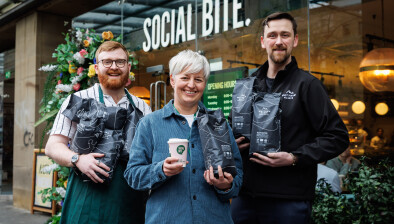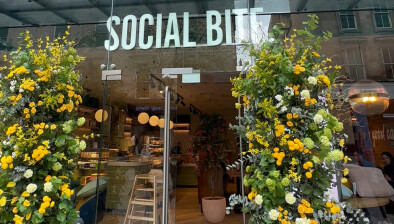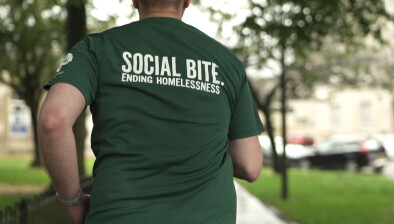Call for action on student homelessness as Social Bite moves into higher education sector

(from left) Mel Swan, commercial and operations director for Social Bite; Josh Littlejohn MBE, co-founder of Social Bite; student Comfort Mensah; Social Bite training and support worker Ambreen Malik and Kevin McGeachan from Matthew Algie
The founder of Social Bite has called for greater support for students at risk of homelessness as the charity launched a series of cafes in universities and colleges across the UK.
A new partnership will see Social Bite-branded cafes serve coffee supplier Matthew Algie’s Elevator blend, with around 10% of profits from coffee sold donated to the charity and social enterprise’s ongoing work to end homelessness.
The move comes after a recent report revealed a shortage of more than 25,000 student bed spaces in Scotland. Co-authored by bodies including the University of Glasgow, University of Stirling and CIH Scotland, the report for a cross-party group on housing found there is a ‘severe’ student housing crisis in cities including Glasgow, Edinburgh, and Dundee.
Social Bite founder Josh Littlejohn MBE explained students from low-income backgrounds, international students, and students who are estranged from their families, where financial support from family or caregivers is not always possible, are most at risk.
According to The National Union of Students (NUS), in 2023 one in ten students reported having experienced homelessness in the past. Additionally, more than a fifth of all international students in Scotland have experienced homelessness.
Masters student Comfort Mensah moved to Scotland from Ghana in September last year to study. Despite arranging to live with a family initially, she was classed as homeless as the arrangement was temporary.
The 34-year-old student, who graduated with a planning and development degree at Christian Service University, in Ghana, to gain entry to university in Scotland, relied on help from a family she was set up with through her church in Glasgow’s East End, as well as small amounts of money from her mother, a retired teacher, who Comfort says couldn’t afford to support her long-term. Comfort had just £500 with her when she arrived, and applied for hundreds of jobs in a desperate search for work and permanent accommodation all while juggling her demanding studies.
With the threat of rough sleeping looming, Comfort’s situation caused her mental health to suffer severely, as well as impacting her grades as she spent every spare minute applying for jobs – also volunteering to gain experience – all to no avail.
She said: “It was really hard. I had so little money and was getting nowhere trying to find work. I put on a positive face, but behind it I was crashing down. I know I had a roof over my head, but I didn’t have a home – somewhere to go back to that was my own. I couldn’t pay rent, and I couldn’t get a job. The uncertainty around it was so hard to deal with, and I was in a mental health crisis. We were in the colder months and rough sleeping was a high possibility.”
Comfort Mensah and Josh Littlejohn MBE
It wasn’t until Comfort sought help through Social Bite’s Jobs First programme that the situation improved as she found work in a Harvester restaurant in January – almost four months after arriving in Scotland. Although she is limited to 20 hours per week on a student visa, she has been able to save enough for her own room, and has seen a huge improvement in her grades.
The student, who has ambitions to be a teacher in Scotland, added: “Social Bite came through. Even though it was hard at first as I didn’t have experience, they helped me through it. Having a job, earning my own money, and then finding a room was totally transformational. I never sleep well, but that first night I fell asleep before 8pm and slept right through to 8am – I’d never slept like it. Maybe this is how it is to be at peace.
“My advice to anybody in my situation is don’t give up – there is somebody out there who can help. When you meet that person, your mind will be blown by how much they will help. There is hope in humanity.”
Littlejohn said the situation faced by Comfort and thousands of other students across Scotland shows how urgently the accommodation crisis needs to be brought under control, arguing student housing must be integrated into local housing strategies.
He said: “Rent controls should include purpose-built student accommodation, more financial support for students who are at higher risk of homelessness, such as an estranged student grant that can be paid year round and not just within term time. There also needs to be more guarantor services for UK national students as there is currently only one, and it is very expensive. International students currently have very limited rights to work making it harder for them to meet their cost of living currently.”
Pay It Forward
As part of its milestone move into education, Social Bite has already opened its first cafes in universities and Matthew Algie is in talks with several universities and colleges looking to open Social Bite cafes. Social Bite’s Pay It Forward system will also be in place.
Mr Littlejohn added: “Through our amazing partnership with Matthew Algie, we now have an opportunity to put Social Bite in front of thousands of young people across the country. With Matthew Algie’s support we’re not only able to supply their fantastic coffee, but to bring awareness of the homelessness issue to a new generation.
“Seeing Social Bite in their university or college might even encourage students to seek support for their own housing or encourage those around them to. By being aware of homelessness, students can begin to combat stigma in their own community and also hold the government to account on these issues.”
Raj Juneja, head of education at Matthew Algie, said: “Social Bite’s move into the education sector is a milestone moment, and we are all proud to play a part in supporting the amazing work Social Bite does to support everybody affected by homelessness.
“We have a number of Social Bite cafes in the pipeline already at colleges and universities across Scotland and the UK, and there is significant interest in further outlets across our large network of cafes throughout the UK education system, helping raise awareness amongst a key audience while generating funds for the Social Bite cause.”









